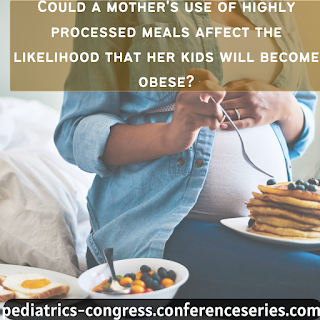Could a mother's use of highly processed meals affect the likelihood that her kids will become obese?
Irrespective of other lifestyle risk factors, a mother's consumption of ultra-processed foods appears to be associated with an elevated risk of overweight or obesity in her offspring, according to a U.S. study that was published in The BMJ today.
However, they propose that in order to enhance nutrition for women of childbearing age and lower childhood obesity, dietary recommendations should be improved, financial and social barriers should be addressed, and mothers may benefit from restricting their consumption of highly processed foods.
Modern Western diets frequently include ultra-processed foods that are linked to weight gain in adults, such as packaged baked goods and snacks, fizzy drinks, and sugary cereals. However, it's not obvious if a mother's consumption of highly processed foods affects the body weight of her children.
Several additional possibly significant elements that are well-known to be closely associated to childhood obesity were also taken into consideration. These included the mother's weight (BMI), activity level, smoking status, living situation (with or without a spouse), and partner's level of education, as well as the children's intake of ultra-processed foods, activity level, and sedentary time.
The findings indicate that a mother's use of highly processed foods was linked to a higher incidence of overweight or obesity in her offspring.
The researchers recognize that some of the observed risks may be related to other unmeasured factors and that self-reported food and weight measures may be vulnerable to misreporting because this is an observational study, which makes it impossible to determine the cause.
Other significant limitations include the fact that some of the offspring participants were lost to follow-up, which led to some of the analyses being underpowered, especially those concerning peri-pregnancy intake, and that mothers were primarily white and from similar social and economic backgrounds, so the findings may not apply to other groups.
However, because the study combined information from many sizable ongoing investigations that included thorough dietary assessments over a considerable amount of time, the findings appear to be reliable. Nevertheless, they draw the conclusion that these findings "affirm the necessity of dietary guidelines and the implementation of programs to improve nutrition for women of reproductive age to increase offspring health."

.png)
.jpg)
Comments
Post a Comment